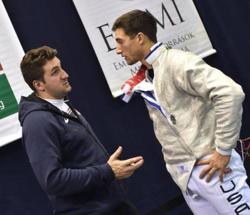
The 2013 Pan American Championships silver medalist, a five-time Junior and Cadet World Championship Team member and two-time NCAA Champion, Ochocki is currently an assistant coach at the University of Notre Dame in addition to owning Advance Fencing & Fitness Academy in New Jersey.
How did you become you interested in fencing in the first place?
When I was young I tried fencing at a free Saturday program and my first coach Janusz Mlynek made it so much fun. I instantly got hooked since it was a sport that I could control the outcome and didn't have to rely on other people. It was the perfect combination of athleticism and strategy.
Who has been influential in your coaching development?
Everyone. I try to learn from everyone on all different levels, but I'd have to say the biggest contributor to my coaching development would be my own coach, Yury Gelman. He continues to mentor me and answer any questions I have. He was the one who taught me the game and built and amazing foundation and understanding of the sport in me. I have to credit him with my success because he put so much into me and because of that I was able to be not just a successful athlete but also a pretty good coach. Also, Ed Korfanty plays a big part. He has a different vision and style of coaching; I love to pick his brain about ideas and how he sees things. Additionally, over the past two years I've had the privilege to work alongside foil coach Buckie Leach and it's amazing to have such a resource of knowledge about the sport and just coaching in general around me on a daily basis. Even though it's foil, there are so many similarities and the general concepts are the same. After answering this question, I have to say I've been extremely lucky to have some of the best coaches in the world by my side and openly share their knowledge with me to help me continue to grow as a coach.
What tip do you have for strip coaching during a competition?
I think strip coaching varies a lot based on the athlete. Some athletes don't need you to say anything; they just feel more comfortable with you being there, while others need your constant voice just telling them to stay calm or focused. So, the biggest thing I'd say is know the athlete and what they need, as well as don't give too much information because it could overwhelm them.
Date Created: August 2018